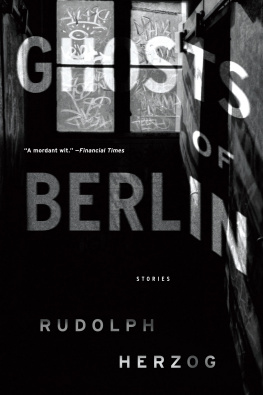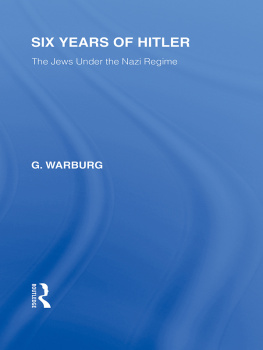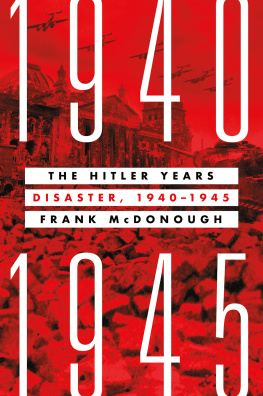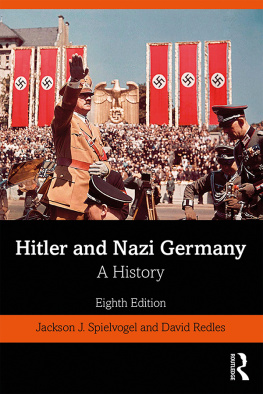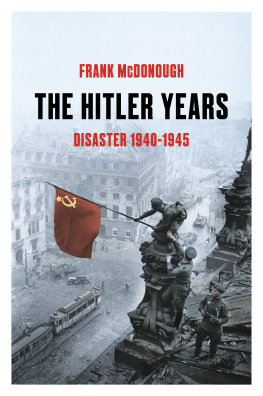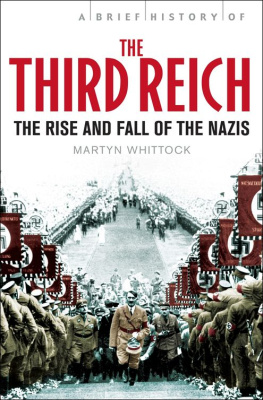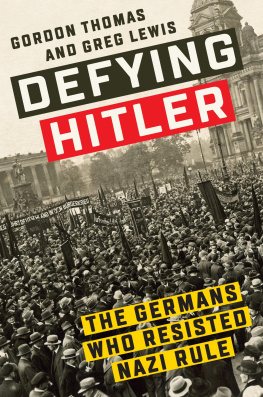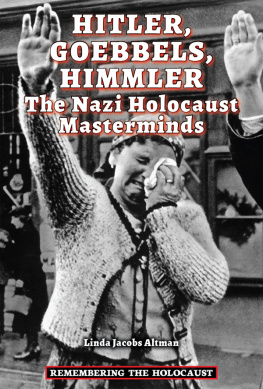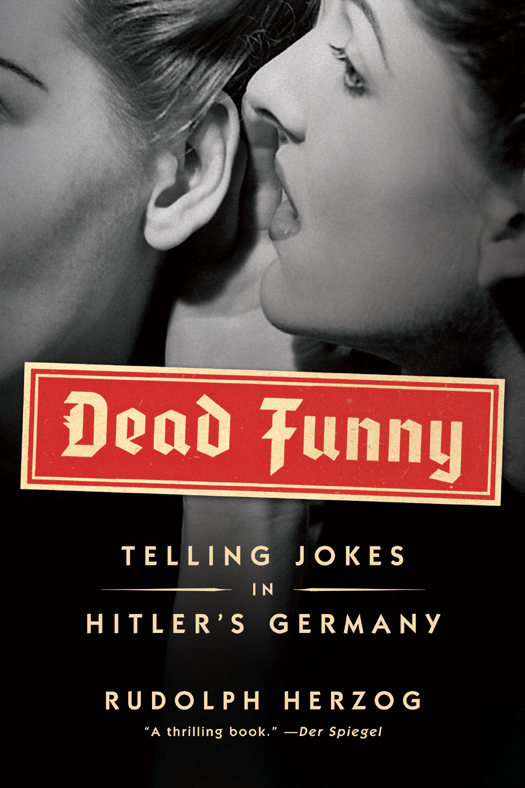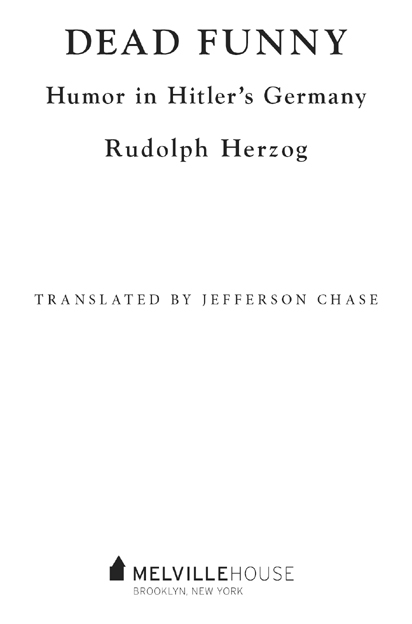Dead Funny: Humor in Hitlers Germany
Originally published in German as Heil Hitler, Das Schwein Ist Tot!
Lachen unter HitlerKomik und Humor im Dritten Reich, by Eichborn Verlag
2006 by Eichborn AG, Frankfurt am Main, Germany
Translation 2011 by Jefferson Chase
First Melville House printing: March 2011
Melville House Publishing
145 Plymouth Street
Brooklyn, NY 11201
www.mhpbooks.com
The Library of Congress has cataloged the hardcover edition as follows:
Herzog, Rudolph.
[Heil Hitler, das Schwein ist tot! English]
Dead funny: humor in Hitlers Germany / Rudolph Herzog ; translated by Jefferson Chase.
p. cm.
Originally published in German as Heil Hitler, das Schwein ist tot! : Lachen unter Hitler : Komik und Humor im Dritten Reich Eichborn Verlag, c2006 Frankfurt am Main, GermanyT.p. verso.
eISBN: 978-1-935554-93-6
1. GermanyPolitics and government1933-1945. 2. National socialism. 3. Holocaust, Jewish, 1939-1945. 4. German wit and humorHistory and criticism. 5. Political satire, GermanHistory and criticism. 6. GermanyPolitics and government1933-1945Humor. 7. National socialismHumor. 8. Holocaust, Jewish, 1939-1945Humor. 9. German wit and humor. 10. Political satire, German. I. Title.
DD256.5.H3746913 2011
943.0860207dc22
2011006705
v3.1
CONTENTS
I. POLITICAL HUMOR UNDER HITLER: AN INSIDE LOOK AT THE THIRD REICH
IS IT PERMISSIBLE to laugh at Hitler? This is a question that is often debated in Germany, where, seeing the magnitude of the horrors the Third Reich committed in their name, many citizens still have difficulty taking a satirical look at it. And when others dare to do precisely that, they are accused of trivializing the Holocaust. Nonetheless, German humorists are always trying to tackle this most sensitive of topics, and jokes at the expense of the Nazis are at their most powerful and revealing when they are spoken in the economical, matter-of-course tone of the satirist.
Is it legitimate to approach Auschwitz using techniques of satire, or would doing so downplay crimes so monstrous that they can hardly be put into words? Whatever ones answer to this question, the fact is that Germans have always laughed at Hitler, even during the twelve years of his terrifying reign. There was no end to political jokes under his regime. Today some of these jokes retain their power, though others seem banal, or simply bad. What they all have in common, however, is the insight they give into what preoccupied and moved Hitlers racial community. Ordinary people aimed sarcastic remarks at aspects of life that got on their nerves, and Nazi-era humoristswhether they sympathized with the soon to be defunct left-wing opposition or supported the fascist powers-that-weremade political jokes.
By analyzing these jokes, we get unusual access to what people really thought during the thousand-year Reich, what annoyed them and what made them laugh, and also what they knew and otherwise took pains to repress from their conscious minds. At the same time, the reactions of the Nazi state to challenges from comedians and others who told political jokes reveal what types of humor the fascist leadership actively feared. This book is intended as a journey back to what is thought of as a humorless age, not to make readers laugh but to give them a new perspective on the most terrible era of German history. It does not ignore the moral debates of the postwar period, but it does not focus upon them, either.
The sources used include interviews with people who lived though the Third Reich, among them the friends of a Protestant pastor who was murdered by the Nazis, the son of a famous comedian and animal trainer, and a well-known German cabaret artist. Other important sources were the biographies of prominent German humorists and the various collections of whispered jokes that were published in the immediate aftermath of World War II. People who laughed at Hitler within their own four walls, the authors of such compilations tried to suggest, disapproved of the Nazis and were perhaps even part of a tacit resistance. Recent research, however, has revealed that this notion, though a comforting idea, is little more than wishful thinking and historical legendmaking.
Political jokes were not a form of resistance. They were a release valve for pent-up popular anger. People told jokes in their neighborhood bars or on the street because they coveted a moment of liberation in which they could let off a bit of steam. That was in the interests of the Nazi leadership, no matter how humorlessly they may have portrayed themselves in the public sphere. Many Germans were conscious of the dark side of the Nazi regime. They were also annoyed at laws forcing them to do this or that and at party bigwigs who treated themselves to lives of luxury while making arbitrary decisions about the lives of others. But that didnt translate into anti-Nazi protests. Those people who let off a bit of steam with a few jokes didnt take to the streets or otherwise challenge the Nazi leadership.
Conversely and significantly, the vast majority of the joke tellers who were denounced and brought before special Nazi courts received a mild punishment, if any. Usually they were let off with a warning. Whispered jokes were a surrogate for, and not a manifestation of, social conscience and personal courage. People who lived through the Third Reich also assert that political jokes were by no means spoken only in hushed tones in the private sphere. Only during the final phase of the war, when it was clear Germany was losing, were draconian punishments handed down for people who made fun of the Nazis. They will be discussed later in this book. As the Nazi system entered its death throes and tried to resist its inevitable demise, there were a conspicuous number of especially cutting jokes, but we have no way of knowing precisely how widespread they were.
The vast majority of political jokes during Hitlers reign were basically uncritical of the system, playing on the human weaknesses of Nazi leaders rather than on the crimes they were committing. Imperial Marshal Hermann Gring, for instance, was a popular target because of his pompous appearance and his love of glamour and medals. One typical joke ran:
Gring recently added an arrow to the many medals on his chest. Its there as a directional sign: To be continued on my back.
Like many Gring jokes, the tone here is familial and affectionate, rather than harsh. The political humor of the time never alluded to the fact that Gring was a sadist who became a mass murderer as well. On the contrary, the imperial marshal appears most often as a sort of pompous but ultimately likeable Falstaff. In fact, Grings all too apparent human weaknesses endeared the second most powerful man in the Third Reich to broad segments of the population. The fact that he was a cold-blooded, cynical despot with no regard for human dignity did not prevent Germans from sympathizing with him right up to his postwar suicide while in Allied captivity.
THERE WERE SOME JOKES, of course, that expressed sheer hatred for and rejection of the Nazi regime. These were known in Berlin, with its coarse, blunt, cosmopolitan sense of humor, as surefire jokes not because they were certain to get a laugh but because they were guaranteed to land anyone caught telling them in front of a firing squad or the middle of a concentration camp. But a good argument could be made that even these most critical jokes ultimately served to stabilize the system. For though some jokes expressed dissatisfaction with the Nazi regime, they also conveyed the message that there was nothing anyone could do about ita message of paralyzing fatalism. For example, one joke during the Third Reich parodied the Nazi slogan The Fhrer leads and we follow as The Fhrer takes the lead and we take what follows. The subtext was that ordinary Germans had no means of affecting disastrous decisions made from on high. Another joke, which was popular in Vienna after Germanys annexation of Austria, was similar in tone:


